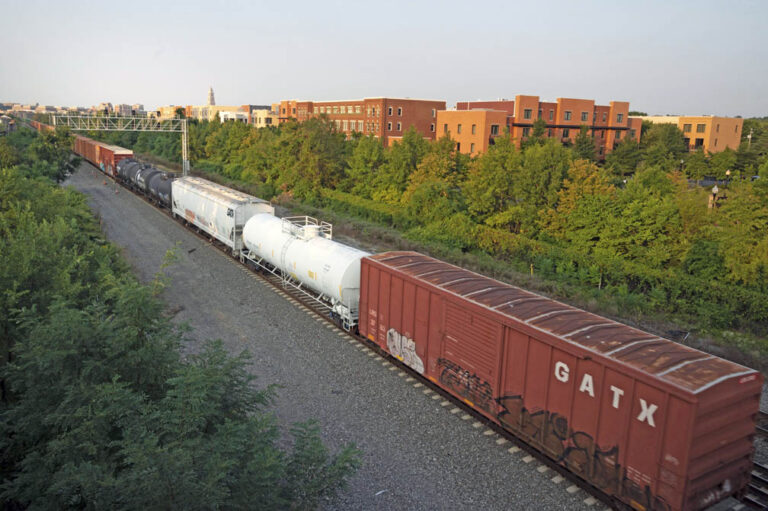WASHINGTON — Legislation to avert what could have been an economically ruinous freight rail strike won final approval in Congress on Thursday as lawmakers responded quickly to President Joe Biden’s call for federal intervention in a long-running labor dispute.
The Senate passed a bill to bind rail companies and workers to a proposed settlement that was reached between the rail companies and union leaders in September. That settlement had been rejected by four of the 12 unions involved, creating the possibility of a strike beginning Dec. 9.
The Senate vote was 80-15. It came one day after the House voted to impose the agreement. The measure now goes to Biden’s desk for his signature.
“Communities will maintain access to clean drinking water. Farmers and ranchers will continue to be able to bring food to market and feed their livestock. And hundreds of thousands of Americans in a number of industries will keep their jobs,” Biden said after the vote. “I will sign the bill into law as soon as Congress sends it to my desk.”
The American Trucking Associations (ATA) praised the votes in a news release.
“The trucking industry thanks Congress for acting swiftly to prevent what could have been a disastrous rail strike,” said ATA President and CEO Chris Spear. “Trains move critical goods like hazardous materials and fuel – including diesel which is already in short supply in numerous parts of the country. Any disruption to these critical supply chains would have been catastrophic for the economy and our industry.
Spear said that hospitals, businesses and ordinary Americans depend on freight rail and trucking for daily necessities, and the trucking industry has neither the equipment nor the manpower to replace a single day of lost freight rail service.
“Truck transportation and railroads are much more complements than substitutes — there is no way the trucking industry can replace all the rail freight. We appreciate Congress stepping up and ensuring that the nation’s wheels — be they steel or rubber — keep moving,” he said.
Mike Steenhoek, executive director of the Soy Transportation Coalition, echoed Spear’s comments.
“We are very pleased both the House and the Senate responded quickly to President Biden’s call for Congress to act to prevent a potential railroad strike,” Steenhoek said. “Throughout the negotiation process, we did not take a side between railroads and railroad workers. However, we clearly are on the side of the American farmer, who would have been harmed if a shutdown would have been allowed to occur. Our preference was for the contract negotiations to be conducted and concluded by the two parties alone, but when those negotiations had reached an impasse and a shutdown was increasingly becoming a possibility, many agricultural and other organizations urged the president and Congress to intervene.”
The American Chemistry Council said its industry would have been devastated by a strike and it estimated that 33,000 tank cars a week transport vital chemicals, including those used at water filtration plants, and millions of gallons of fuel oil and gasoline from coast to coast.
The Senate voted shortly after Labor Secretary Marty Walsh and Transportation Secretary Pete Buttigieg emphasized to Democratic senators at a Capitol meeting that rail companies would begin shutting down operations well before a potential strike would begin. The administration wanted the bill on Biden’s desk by the weekend.
Shortly before Thursday’s votes, Biden defended the contract that four of the unions had rejected, noting the wage increases it contains.
“I negotiated a contract no one else could negotiate,” Biden said at a news briefing with French President Emmanuel Macron. “What was negotiated was so much better than anything they ever had.”
Critics say the contract that did not receive backing from enough union members lacked sufficient levels of paid sick leave for rail workers. Biden said he wants paid leave for “everybody” so that it wouldn’t have to be negotiated in employment contracts, but Republican lawmakers have blocked measures to require time off work for medical and family reasons. The president said Congress should impose the contract now to avoid a strike that he said could cause 750,000 job losses and a recession.
Railways say halting rail service would cause a devastating $2 billion-per-day hit to the economy. A freight rail strike also would have a big potential impact on passenger rail, with Amtrak and many commuter railroads relying on tracks owned by the freight railroads.
The rail companies and unions have been engaged in high-stakes negotiations. The Biden administration helped broker deals between the railroads and union leaders in September, but four of the unions rejected the deals. Eight others approved five-year deals and are getting back pay for their workers for the 24% raises that are retroactive to 2020.
With a strike looming, Biden called on Congress to impose the tentative agreement reached in September. Congress has the authority to do so and has enacted legislation in the past to delay or prohibit railway and airline strikes. But most lawmakers would prefer the parties work out their differences on their own.
The Senate took a series of three votes. The first was on a measure by Sen. Dan Sullivan, R-Alaska, that would have sent both parties back to the negotiating table. But union groups opposed an extension, as did the Biden administration. The proposal was roundly rejected, with 25 senators in support and 70 opposed.
“An extension would simply allow the railroads to maintain their status quo operations while prolonging the workforce’s suffering,” leaders of the Transportation Trades Department of the AFL-CIO said.
The second vote the Senate took would have followed the path the House narrowly adopted the day before, which was to add seven days of paid sick leave to the tentative agreement. But that measure fell eight votes short of the 60-vote threshold needed for passage.
The final vote was the measure binding the two parties to the September agreement. It passed with broad bipartisan support, as it had in the House. While lawmakers voiced consternation about having to weigh in, the economic stakes outweighed those concerns.
“A strike of that magnitude would have a painful impact on our economy and that is an unacceptable scenario as inflation continues to squeeze West Virginians and Americans heading into the holiday season,” said Sen. Joe Manchin, D-W.Va.
Democrats have traditionally aligned themselves with the politically powerful labor unions that criticized Biden’s move to intervene and block a strike. House Speaker Nancy Pelosi told Democratic colleagues it was “with great reluctance” that Congress needed to bypass the standard ratification process for union contracts.
She did, however, hold an additional vote that would have added the seven days of paid sick leave that union workers wanted. That gave Democratic lawmakers in both chambers the ability to show their support for paid sick leave for rail workers while also avoiding a crippling strike.
The call for paid sick leave was a major sticking point in the talks, along with other quality-of-life concerns. The railroads say the unions have agreed in negotiations over the decades to forgo paid sick time in favor of higher wages and strong short-term disability benefits.
The unions maintain that railroads can easily afford to add paid sick time when they are recording record profits. Several of the big railroads involved in these contract talks reported more than $1 billion profit in the third quarter.
The Association of American Railroads trade group praised the Senate vote to impose the compromise deal that includes the biggest raises in more than four decades. Still, CEO Ian Jefferies acknowledged that many workers remain unhappy with working conditions. “Without a doubt, there is more to be done to further address our employees’ work-life balance concerns, but it is clear this agreement maintains rail’s place among the best jobs in our nation,” Jefferies said.
Union groups were unhappy with the final result.
“The Senate just failed to pass seven days of paid sick leave for rail workers. We are grateful to the 52 Senators who voted YES and stood with rail workers,” tweeted the Transportation Trades Department labor coalition. “Shame on the 43 elected leaders who abandoned the working class. We will not forget it.”
The Trucker Staff contributed to this report.
The Associated Press is an independent global news organization dedicated to factual reporting. Founded in 1846, AP today remains the most trusted source of fast, accurate, unbiased news in all formats and the essential provider of the technology and services vital to the news business. The Trucker Media Group is subscriber of The Associated Press has been granted the license to use this content on TheTrucker.com and The Trucker newspaper in accordance with its Content License Agreement with The Associated Press.







Appreciate the informative article, but it didn’t seem to have enough of the rail owners’ perspective and seemed to place a little too much on the political machinations. Would like to have seen a more balanced argument from both sides of the issue.